Pantslessness (Metaphorical and Otherwise) with Pete
 May 24th, 2017 by jules
May 24th, 2017 by jules
(Click to enlarge)
I’ve got a BookPage review of Rowboat Watkins’s Pete With No Pants, released by Chronicle Books in early May. I love this book, and you can read why at my review over here at their site.
But there’s more: I chatted with Rowboat about this book. He shares his thoughts about the story and its meaning for him, and the discussion opened my eyes to the book in new and wonderful ways. Let’s get right to it, and I thank him for visiting 7-Imp again.
Jules: Hi, Rowboat. We’ve already chatted a bit about this book, me and you, but now we’re making it official for a chat I can post at 7-Imp. Thanks again for visiting.
Rowboat: Hey, Jules. Thank you so much for having me back!
Jules: You’ve shared this story at a school or two, yes? How’d that go? How did the students respond?
Rowboat: The school visits were fun, I think. Or at least the kids were fun. I kind of go into a panic state and have no idea what happens whenever I have to speak in front of a group larger than three people. Even if they are 300 adorably funny, hand-waving, beaming and wide-eyed smart little people all sitting on the floor in rows. And, as always, the kids were incredible listeners and had the best questions and had wacky suggestions for what to draw whenever we got to the drawing part of the visit, and my panic was for naught. I think. But these things are just hard to know when one really has no memory of them.
But what’s not to like about a stubby elephant who doesn’t want to wear his pants? Right?
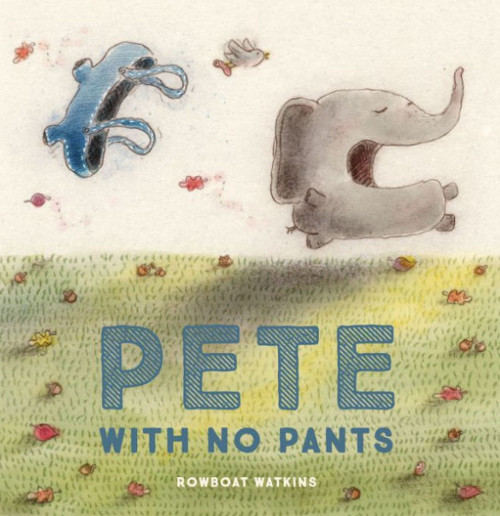
Jules: Right. I like Pete. He instantly endeared himself to me.
You and I have talked a bit about this already, but do you want to talk here for blog readers about how and when Pete’s mother became so pivotal to the story? I think I say in my review that she’s the beating heart of it (or some such thing that I hope wasn’t too review-speak’y). It wasn’t always that way, right? The story started a bit differently (first drafts, that is)?
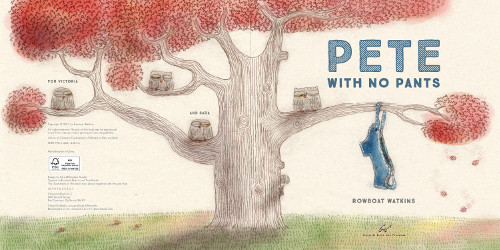
(Click to enlarge)
Rowboat: That’s right, Jules. Pete’s path was not a straight line.
The story started off vaguely about me, I think. Because my thoughts and my pants are the only ones I vaguely pretend to know. The story was mostly about Pete’s wanting to find a friend with whom he could establish a common language. In these early versions, the boulders played a bigger (anthropomorphized) role, and the bird was a more central character. And Pete actually learned how to fly.
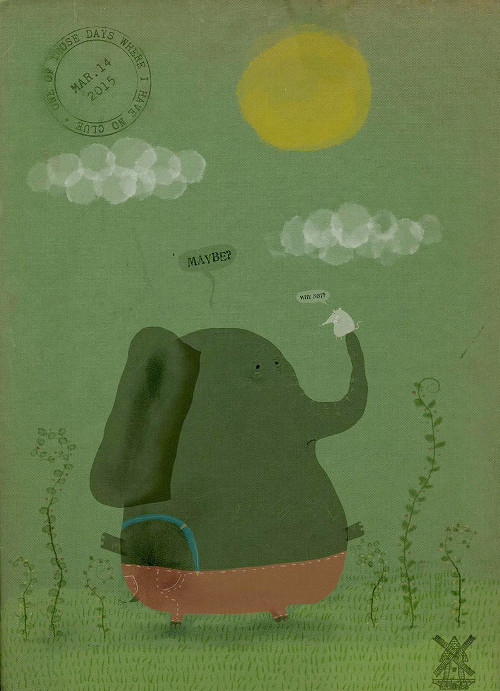
the designer thought didn’t feel right for the book …”
(Click to enlarge)
His mom was more of a background figure, who never tires in her quest to put Pete back into his pants. In this sense, she was the well-intentioned but unwitting villain of the story. Because she never learns to see Pete’s pantslessness for what it is. Which is not an act of sartorial sedition so much as an act of self-liberation. Pete’s pants are (for whatever reason) an impediment to his being able to imagine whatever else he might be — other than an elephant in pants. They are a metaphor for the way his mom wants to see him. And by extension, the way society wants to see him. Which becomes the way Pete feels he is supposed to see himself. I think we’ve all worn these kind of metaphorical pants at some point, no?
small.jpg)
Anyway, while I was trying to untangle my metaphors, I found myself thinking about my niece, who was, not so long ago in her still young life, formerly my very withdrawn nephew. And how her incredible journey toward becoming the bouncy girl she now is was so dependent on her having parents who were willing to put down the literal pants they were putting her in — and their somehow having the parental wherewithal to allow their child to dress herself. Literally and figuratively. My niece’s transformation was and is so contingent on her knowing her parents love(d) and see her for whoever she is.
It was in thinking about them that I realized Pete’s mom needed to become more than a background figure, forever wielding pants. Which is why she briefly lets go of Pete’s pants toward the end of the book. And doesn’t make him put them back on as they fly home to dinner on the final spread. Pete’s mom is the only character in the book to answer Pete’s knock-knock joke and ask, “Who’s there?” But in doing so, she isn’t simply obliging Pete as the initiator of a joke, or setting up his punchline. She is also earnestly asking her son: “Who are you? Please tell me, because I am listening.”
small.jpg)
Does any of that make sense? The book isn’t necessarily about transgender kids any more than it is necessarily about me or elephants or about not wearing actual pants. I love pants. But the book is my circuitous attempt to make sense of the difficulty many (if not most) of us experience in learning how to become (or know) ourselves, and how we—as kids and parents and people—need to learn to see beyond our default assumptions and default expectations sometimes — if we truly hope to see those loved ones in our lives (including our own selves), who are maybe not willing (or able) to conform to our societally pants-prescribing norms. Have I scared you and everyone else away? Knock knock?
left.jpg)
right.jpg)
Jules: That makes all the sense in the world, and it really breaks the book open wide for me. That is: It was already a story I loved, and you’ve added this new dimension to it that completely fits. I’ve been thinking lately, too, about how hard it can be for some parents (probably me too) to do the whole unconditional love thing, the whole you-are-good-enough-just-as-you-are thing. Every time I see a parent struggle or if I myself stumble, it’s because we are altogether failing at that.
I love the occasional use of panels on some of these spreads and how they work in pacing the story so well. Did you set out to tell the story knowing you would use panels, or did the story call for them?
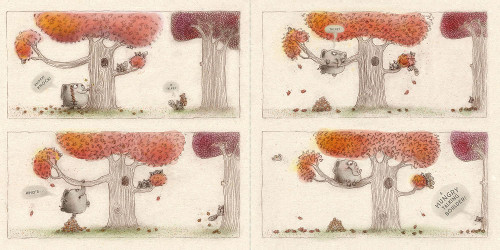
Rowboat: The panel spreads were pretty much always there from the earliest thumbnails, Jules. As a way of pacing things, yes. And of orienting each episode with respect to the others. But mostly as a way of trying to show the passage of time. Because I wanted the reader to think that Pete was probably pantsless yesterday. Before the book even started. And that he will likely be pantsless at some point tomorrow too. And that his mom was probably skulking about the trees (or wherever) yesterday, trying to get Pete to put his pants back on.
But there’s only so much slowly unfolding time one can cram within the confines of a 40-page picture book and still have time to tell a story. And I definitely wanted the reader to be aware of the passage of time. Because I don’t think any self-discovery worth discovering happens quickly or effortlessly. Life requires resilience; resilience requires patience; and patience needs time.
Oh no. I have become a fortune cookie.
small.jpg)
(Click to enlarge spread)
Jules: If you could henceforth take over fortune cookie-writing in this world, I’d be on board with that.
Rowboat: I’d much prefer it if you were in charge of fortune cookie-writing going forward, Jules. Speaking of which, I’m embarrassed to admit I still save the good fortunes I get. They’re loosely piled on the chalkboard shelf over my computer next to the wheatshaft pennies I find. I love finding a wheatshaft penny in everyday pocket change. For reasons I can’t fully explain, but it always fills my day with joy. As does speaking with you — and reading your posts. Your 2¢ worth is always priceless. So thank you, Jules!
Jules: Thank you for chatting with me about this book.
One final question: What’s next for you? Working on anything now you’re allowed to talk about?
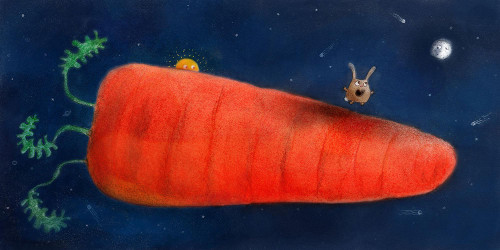
Rowboat: I recently turned in final art for a book about a big bunny, called Big Bunny, which will come out next spring.
And I’m working on a book right now about marshmallows, which will be illustrated with photographs of real marshmallows and construction paper props and will come out in the fall of 2018 or spring of 2019. I can’t remember which. I know nothing about photography, but I love construction paper and drawing on marshmallows, so I’m very excited about that book. Even though I have no idea what I’m doing.
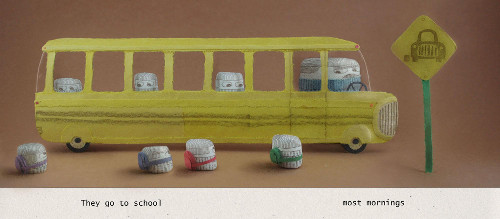
Looking forward to crashing four-horsepower Super Rosengarts into each other again sometime!
Ed. Note: Below are some preliminary images from Rowboat:
Rowboat: These are the first and second appearances of Pete in my sketchbook. He was originally named Barnaby.
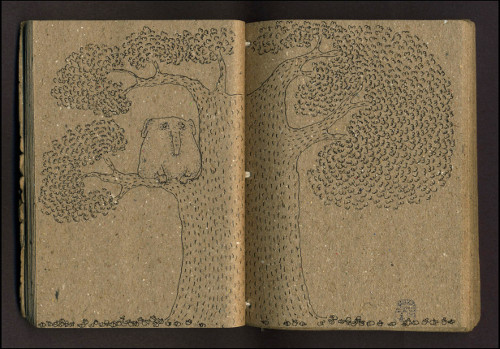
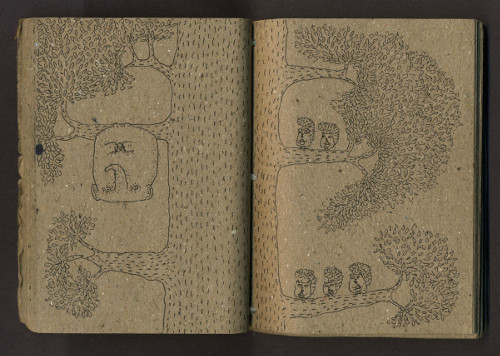
At some point, I realized Barnaby’s name was actually Nicholas. And the working title for the book, as I started thinking about this elephant in the trees and whatever his back story might be, was originally Nicholas Is a Squirrel. It wasn’t until I discovered Nicholas’s name was really Pete (I don’t remember how), and that Pete’s ability to conceive of himself as a squirrel was somehow contingent on his not wearing pants, that I changed the title to Pete Without Pants.
Why Pete not wearing pants even occurred to me at all, but the squirrels’ not wearing pants was something that I took as a given, is something I can’t explain. I guess it was because squirrels are pretty much always in trees, when not savaging flowers for sport, but elephants normally aren’t — and I wondered why an elephant might be sitting up there. How or why I realized his being up in a tree might have something to do with his not wearing pants is something, like I said, that I can’t fully explain. But I knew his not wearing pants had something to do with his being in a tree and thinking he was a squirrel.
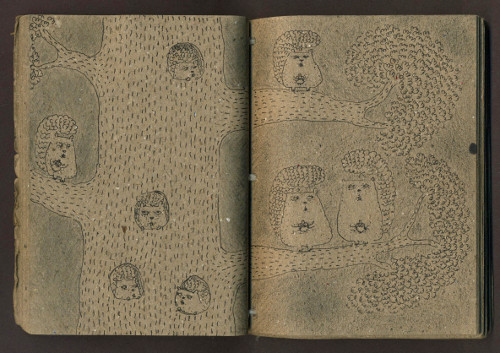
These are early thumbnails:
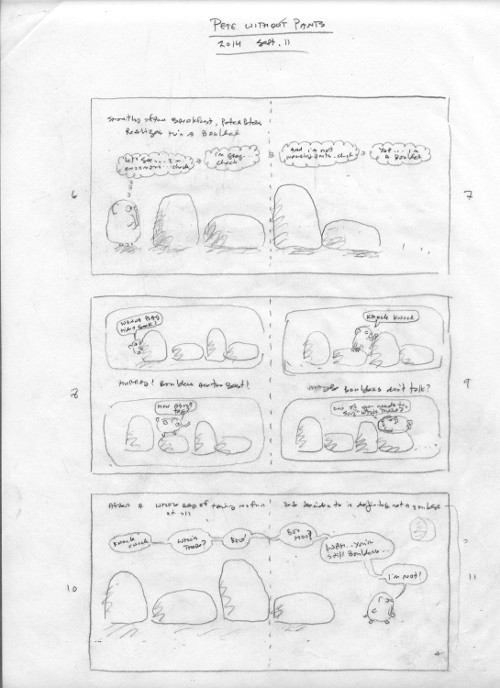
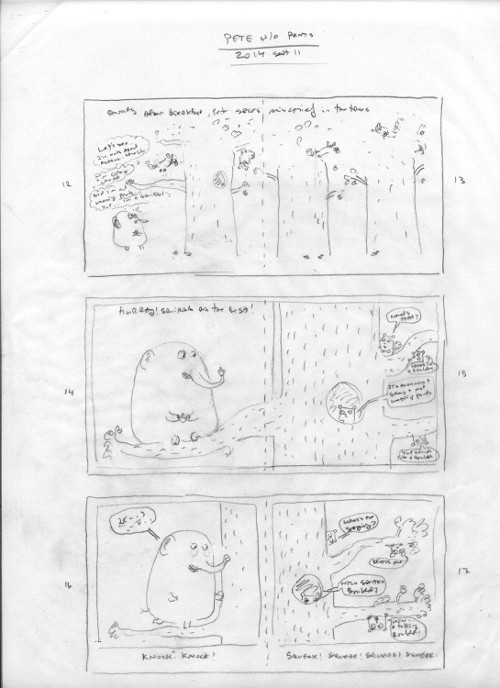
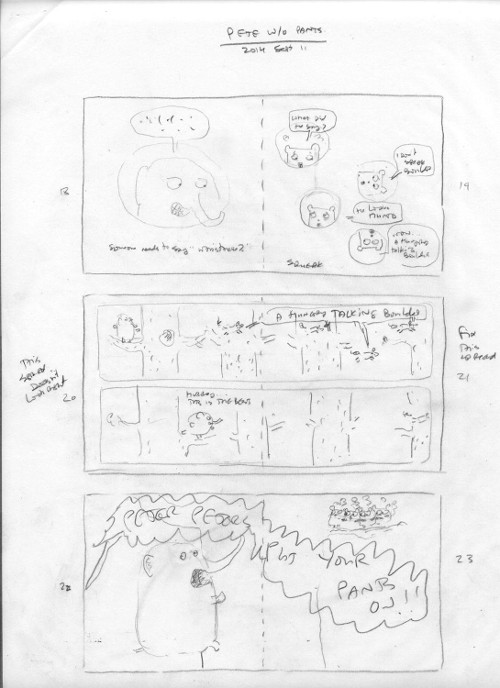
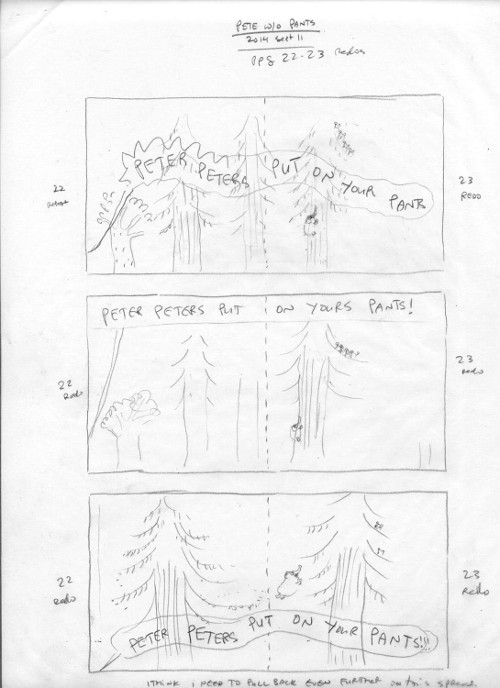
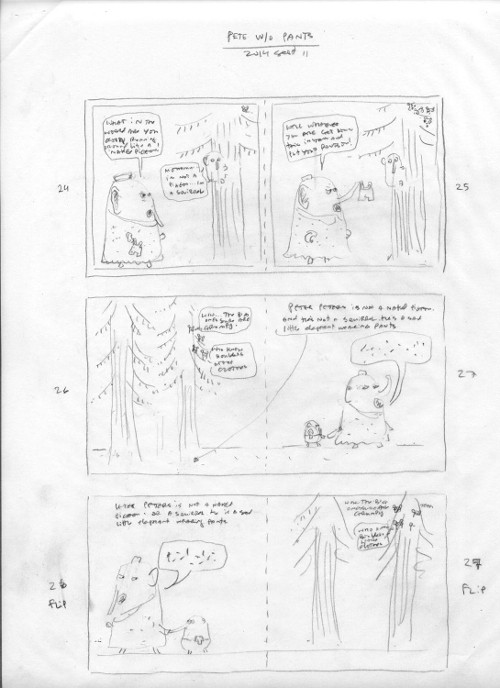
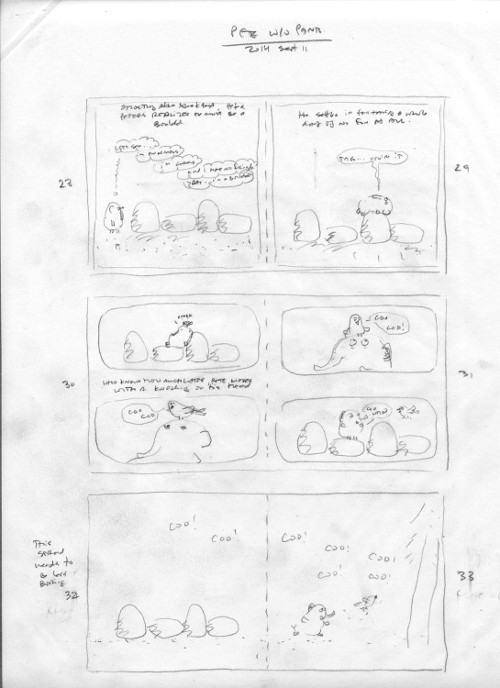
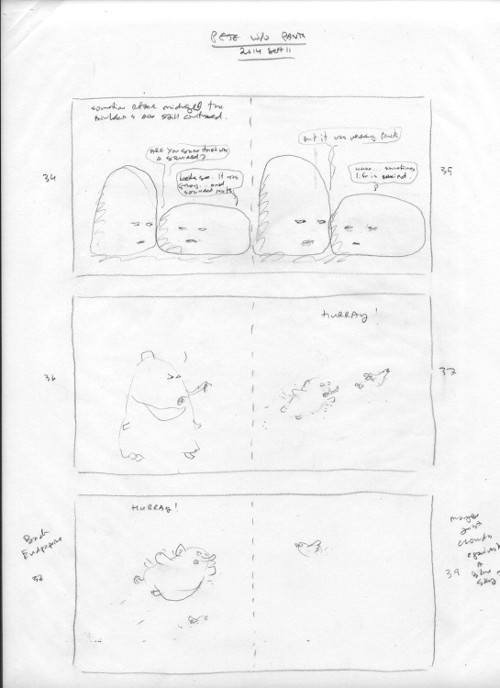
The boulders actually played a much bigger role in the earlier versions of the story. They spoke amongst themselves. And one of them chose to wear a pair of overalls at the end. And Pete learns how to fly like a bird. The story was much more about the bird and Pete’s ability to literally transform himself into something the same as his flying friend. And Pete’s mom remains kind of the inadvertent pants-wielding villain of the story.
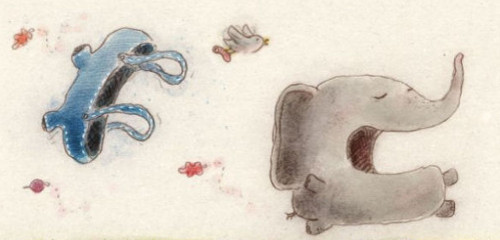
PETE WITH NO PANTS. Copyright © 2017 by Rowboat Watkins. Published by Chronicle Books, San Francisco. All images here reproduced by permission of Rowboat Watkins.
small.jpg)

[…] Rowboat and Pantslessness featured on 7-Imp’s […]
I must find this book. What a wonderful one, inside and out – thank you for featuring it.